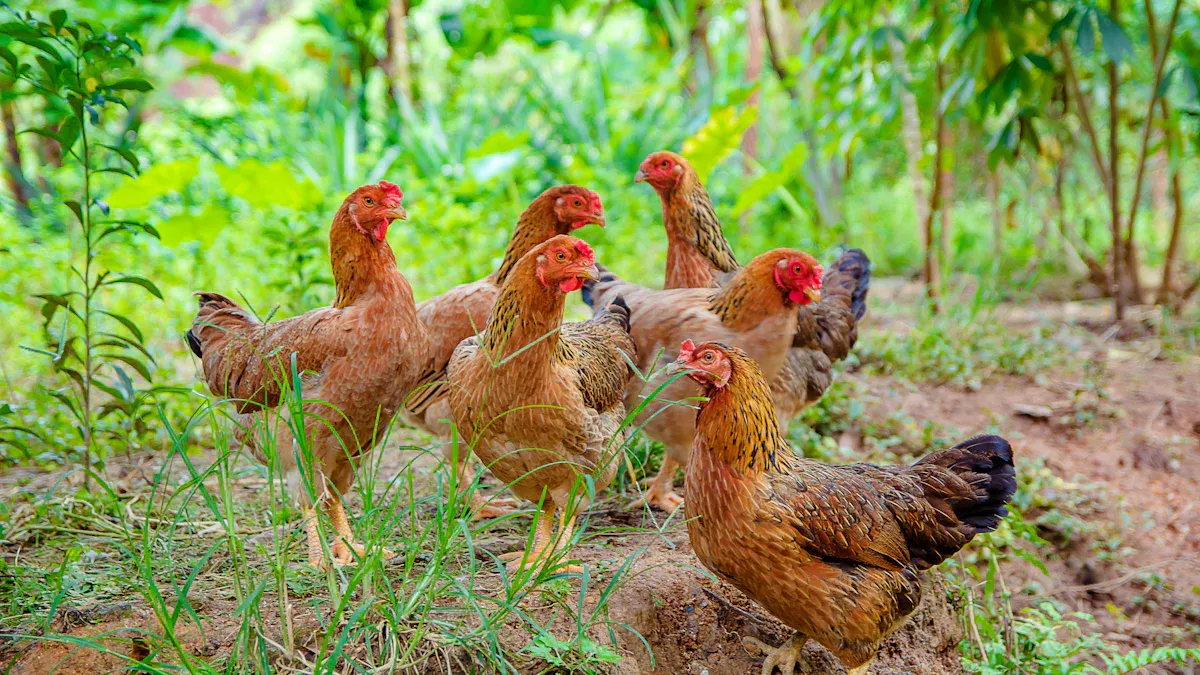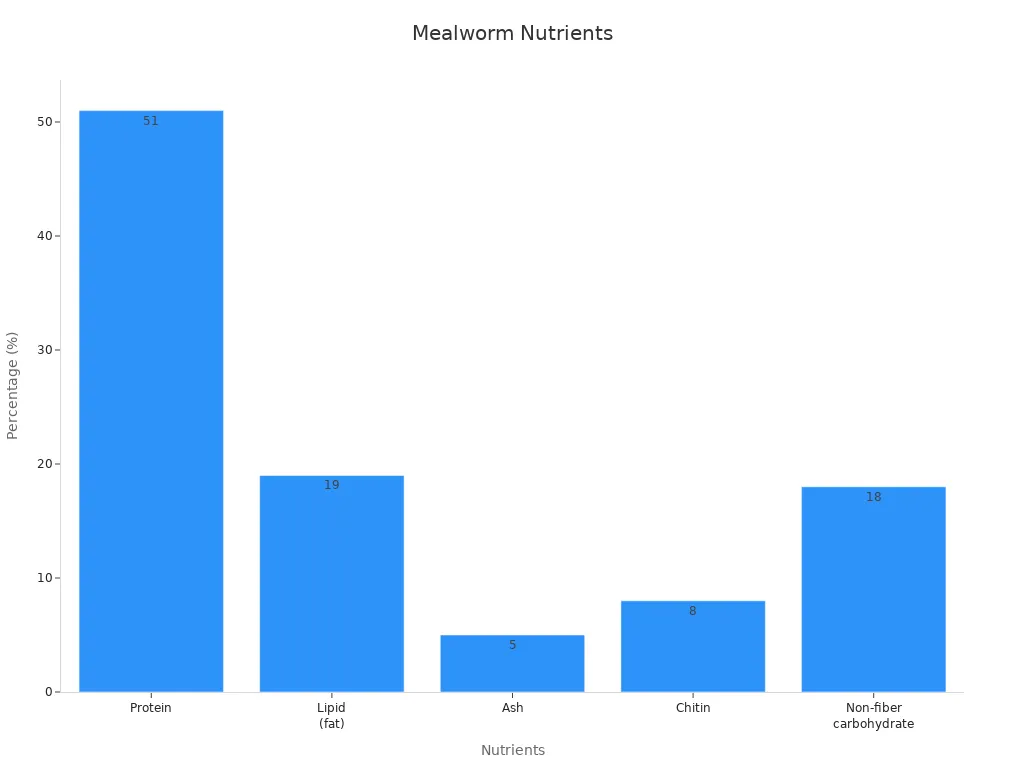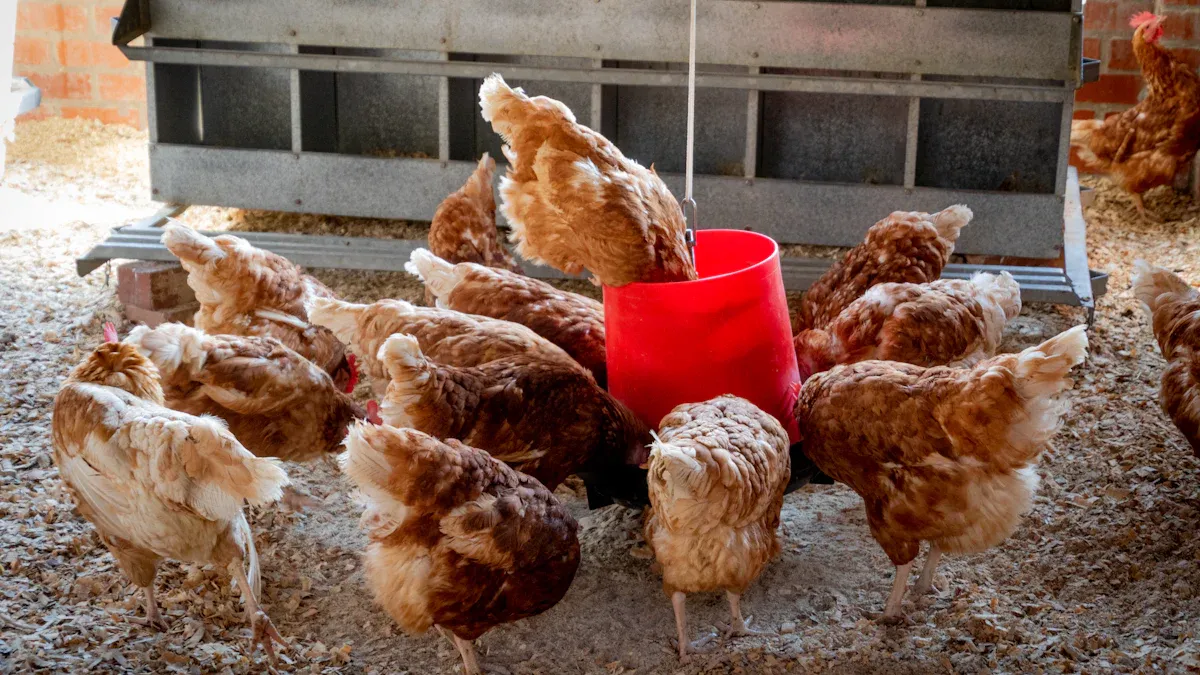
Mealworms chicken feed delivers a powerful boost for chickens in 2025. Packed with protein, vital minerals, and healthy fats, it helps birds grow strong and lay better eggs. Studies show that even a 5% inclusion in diets improves growth and health, making mealworms a smart supplement for any flock.
Key Takeaways
- Mealworms provide high protein, healthy fats, and essential nutrients that help chickens grow strong and lay better eggs.
- Feeding mealworms improves chickens’ health by boosting immunity, supporting gut health, and encouraging natural foraging behaviors.
- Offer mealworms as a treat two to three times a week, about 10-15 dried mealworms per chicken, to enhance growth and egg quality without replacing main feed.
Mealworms Chicken Feed: What Makes It a Superior Supplement
What Are Mealworms and How Are They Used in Chicken Feed
Mealworms are the larvae of the darkling beetle. Farmers raise them indoors on wheat bran, potatoes, or carrots. These tiny creatures grow in stacked tubs, making them space-efficient and easy to farm. Many chicken keepers use mealworms chicken feed as a supplement, not a main diet. Dried mealworms offer a convenient treat or mix-in for daily rations. In North America, new mealworm farms have expanded production, making this feed more available than ever. The growing demand for soy-free and sustainable options has helped mealworms chicken feed become a popular choice in 2025.
Nutritional Profile: Protein, Healthy Fats, and Essential Nutrients
Mealworms pack a punch when it comes to nutrition. They contain high levels of protein, healthy fats, and essential amino acids. Check out the table below for a quick look at their nutrient content:
| Nutrient | Range / Value (Dry Matter Basis) |
|---|---|
| Protein content | 36.3% to 74.1% |
| Fat content | 20.3% to 22.8% |
| Essential amino acids | Up to 30.4% |
Mealworms also provide B vitamins, iron, calcium, and zinc. These nutrients help chickens grow strong, develop healthy feathers, and lay better eggs.

Why Mealworms Chicken Feed Stands Out in 2025
Mealworms chicken feed stands out because it delivers more than just protein. Studies show that adding mealworms improves egg quality, including albumen weight and yolk freshness. Eggs from mealworm-fed birds have milder flavors and better oxidative stability. Compared to traditional feeds, mealworms offer higher protein and fat, plus special ingredients like chitin and antimicrobial peptides that support gut health. Farmers can use mealworms to replace part of soybean meal or fishmeal without losing performance. This makes mealworms chicken feed a smart, sustainable, and effective supplement for modern flocks.
Benefits of Mealworms Chicken Feed for Flock Health and Productivity
Enhanced Growth, Feather Quality, and Molting Support
Chickens need strong bodies and healthy feathers to thrive. Mealworms chicken feed helps them reach their best potential. When chickens eat mealworms, their gut health improves. A study showed that chickens fed a diet with dried mealworms had more diverse gut bacteria. This diversity means their digestive systems work better, which often leads to better growth and feather condition. Healthy feathers help chickens stay warm and look vibrant, especially during molting. Farmers notice that birds eating mealworms recover faster from molting and grow back shiny, smooth feathers.
Improved Egg Production and Richer Yolk Color
Egg quality matters to every chicken keeper. Mealworms provide protein and nutrients that support egg production. Several studies have looked at how insect meals, like mealworms, affect laying hens. These studies found that hens eating mealworms often lay more eggs and show better egg characteristics.
- Hens fed insect larvae meal as a protein source showed improved productivity.
- Another study in a tropical setting found that larva meal boosted laying performance and egg quality.
Yolk color is another sign of a healthy diet. Chickens that eat mealworms and fresh greens lay eggs with darker, richer yolks. Research shows that diets with mealworms and plants like chicory or mulberry leaves give eggs a deeper color. The nutrients and pigments in mealworms, along with other natural foods, make yolks more vibrant and appealing.
Tip: Want eggs with golden yolks? Try adding mealworms and leafy greens to your flock’s diet.
Stronger Immunity and Stress Reduction
A healthy immune system keeps chickens safe from illness. Mealworms contain chitin and special peptides that help boost immunity. Studies show that chicks eating mealworm meal gain more weight and have better immune markers. For example, Arbor Acres broiler chicks fed 2.5% mealworm meal gained more weight and had a better balance of blood proteins. Feeding 5% mealworm meal lowered harmful bacteria in the gut. Other research found that mealworms help chickens resist disease and recover from stress. The prebiotic effects of chitin and the presence of antimicrobial peptides make mealworms a smart choice for supporting flock health.
- Mealworm meal improves weight gain and immune balance.
- It lowers harmful gut bacteria and supports healthy digestion.
- Chitin and peptides help chickens fight off illness.
Encouraging Natural Foraging and Mental Well-Being
Chickens love to scratch and peck. Mealworms encourage these natural behaviors. When keepers scatter mealworms in the yard or mix them into feed, chickens become more active. This activity keeps them happy and reduces boredom. Chickens that forage for mealworms show less stress and better social behavior. They also get mental stimulation, which is important for their well-being. Many chicken owners notice that their flocks seem more content and lively when mealworms are part of their routine.
Chickens that forage for mealworms stay active and alert. This simple treat supports both their bodies and their minds.
| Metric | Key Findings for 2025 Mealworm Chicken Feed Performance |
|---|---|
| Breeding Density (adults/cm²) | Optimal at 1.6 adults/cm² for industrial production |
| Larvae Number per Crate | Increased significantly with higher breeding density |
| Larval Final Body Weight (BW) | Higher at densities 1.6 adults/cm² and above |
| Feed Intake | Increased with breeding density |
| Feed Conversion Ratio (FCR) | Worsened with increasing density but balanced by yield |
| Protein Content (%) | Highest at 1.6 adults/cm² density (P < 0.001) |
| Lipid Content (%) | Significantly higher at 1.6 adults/cm² (P < 0.05) |
| Cholesterol Content (%) | Highest at 1.6 adults/cm² (P < 0.001) |
Mealworms raised at the right density offer the best nutrition and yield, making them a top choice for chicken feed supplements in 2025.
Practical Guide to Feeding Mealworms Chicken Feed

Recommended Amounts and Feeding Frequency
Chicken keepers often wonder how much mealworms chicken feed to give their flock. Most experts suggest offering mealworms as a treat, not as the main food. A good rule is to feed about 10-15 dried mealworms per chicken, two or three times a week. This amount gives birds a protein boost without overdoing it. During molting or breeding, keepers can offer mealworms more often to support extra needs. Always provide fresh water and a balanced main feed alongside treats.
How to Integrate Mealworms into Daily Diets
Adding mealworms to a chicken’s routine is easy. Many keepers scatter mealworms in the yard to encourage natural foraging. Chickens rush to peck and scratch, showing more activity right after mealworms hit the ground.
- Foraging jumps during the first hour after scattering mealworms, much more than with other treats.
- Chickens love the challenge and stay busy, which helps reduce boredom and stress.
- Treats like mealworms can even help with training and bonding.
Mealworms fit well into daily diets. Studies show that up to 15% of a chicken’s feed can include mealworms, but keepers should balance the diet with other protein sources.
Sustainability and Cost-Effectiveness for Chicken Keepers
Mealworms offer a sustainable protein source. Farmers can raise them on food scraps or grains, saving space and resources. Mealworms chicken feed can replace some soybean meal or fishmeal, making it a smart choice for eco-friendly flocks. Dried mealworms store well and last a long time, so keepers get value for their money. Happy, healthy chickens mean better eggs and less waste.
Chickens thrive with the right nutrition. Mealworms chicken feed gives them a boost in health and egg quality. This supplement fits into any routine. Chicken keepers see stronger birds and brighter eggs. Try it for a happier, more productive flock in 2025.
FAQ
How often should chickens eat mealworms?
Most keepers give mealworms two or three times a week. This schedule keeps chickens healthy and happy without overfeeding.
Can mealworms replace regular chicken feed?
Mealworms work best as a supplement. Chickens still need a balanced main feed for complete nutrition.
Are dried mealworms as good as live ones?
Dried mealworms offer the same nutrition as live ones. They store longer and make feeding easier for busy chicken keepers.
Tip: Store dried mealworms in a cool, dry place for best freshness!


